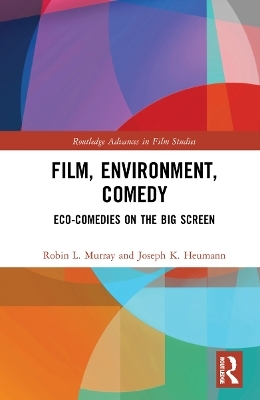
Film, Environment, Comedy
Routledge (Verlag)
978-1-032-25041-0 (ISBN)
This book offers a space in which to explore the complex ways environmental comedies present their eco-arguments. With an organizational structure that reveals the evolution of both eco-comedy films and theoretical approaches, this book project aims to fill a gap in ecocinema scholarship. It does so by exploring three sections arranged to highlight the breadth of eco-comedy: I. Comic Genres and the Green World: Pastoral, Anti-Pastoral, and Post-Pastoral Visions; II. Laughter, Eco-Heroes, and Evolutionary Narratives of Consumption; and III. Environmental Nostalgia, Fuel, and the Carnivalesque. Examining everything from Hollywood classics, Oscar winners, and animation to independent and international films, Murray and Heumann exemplify how the use of comedy can expose and amplify environmental issues to a wider audience than more traditional ecocinema genres and can help provide a path towards positive action and change.
Ideal for students and scholars of film studies, ecocriticism, and environmental studies, especially those with a particular interest in ecocinema and/or ecocritical readings of popular films.
Robin L. Murray is Professor Emeritus of English (Eastern Illinois University) and continues to teach film courses. Joseph K. Heumann is Professor Emeritus of Communication Studies (Eastern Illinois University) and continues to teach film courses.
Introduction: Defining Eco-Comedy Part 1: Comic Genres and the Green World: Pastoral, Anti-Pastoral, and Post-Pastoral 1. The Green World and the Screwball Comedy: A Pastoral World of Play 2. Turning Romance Green: Anti- and Post-Pastoral Approaches to Love in Gendered Comedies 3. The Shape of Water (2017) and the Post-Pastoral Comic Mash-Up Part 2: Laughter, Eco-Heroes, and Evolutionary Narratives of Consumption 4. The Dead Can’t Dance and Blood Quantum: Contrasting Indigenous Visions "Feeding" the Zombie Apocalypse 5. Turning Climate Crises into Climate Solutions in Woman at War (2018) 6. Housing, Labor, and Comic Evolutionary Narratives in Sorry to Bother You (2018) 7. Consuming Fast Fashion in The Man in the White Suit and In Fabric Part 3: Environmental Nostalgia, Fuel, and the Carnivalesque 8. Nature Guarding "Her Treasures" in Oil Comedies: Local Hero (1983) Versus Fubar: Balls to the Wall (2010) 9. Disney and Pixar’s Cars Franchise: Comic Environmental Nostalgia Versus Simulacra 10. Conclusion: Eco-comedies in Context
| Erscheinungsdatum | 11.05.2022 |
|---|---|
| Reihe/Serie | Routledge Advances in Film Studies |
| Zusatzinfo | 22 Halftones, black and white; 22 Illustrations, black and white |
| Verlagsort | London |
| Sprache | englisch |
| Maße | 152 x 229 mm |
| Gewicht | 440 g |
| Themenwelt | Kunst / Musik / Theater ► Film / TV |
| Geisteswissenschaften ► Geschichte | |
| Naturwissenschaften ► Biologie ► Ökologie / Naturschutz | |
| Sozialwissenschaften ► Kommunikation / Medien ► Medienwissenschaft | |
| Technik ► Umwelttechnik / Biotechnologie | |
| ISBN-10 | 1-032-25041-0 / 1032250410 |
| ISBN-13 | 978-1-032-25041-0 / 9781032250410 |
| Zustand | Neuware |
| Informationen gemäß Produktsicherheitsverordnung (GPSR) | |
| Haben Sie eine Frage zum Produkt? |
aus dem Bereich


